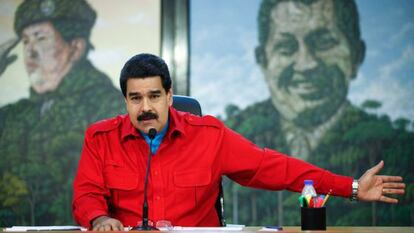Venezuelan government’s winning streak at the Supreme Court
Four attorneys collect more than 45,000 sentences that show judges’ attitude toward the regime

Friends of the Venezuelan attorney Antonio Canova usually say he has a strong stomach. He has to, they think. Canova and his friends Luis Alfonso Herrera, Rosa Rodríguez Ortega and Giuseppe Graterol reviewed 45,474 sentences issued between 2004 and 2014 by the political, electoral and constitutional chambers at Venezuela’s Supreme Courts - in charge of government oversight. The group published the results in a new book, El TSJ al servicio de la revolución (Editorial Galipan), which it is distributing in the country in an almost clandestine manner. Analysts and journalists see this thick book as a gem. The main conclusion of this long essay is that the Supreme Court has never delivered a sentence against the government.
This certainty is like the bark of a leafy tree, heavy with fruits like these: the book’s authors say, as time goes by, Supreme Court justices need to show that they are more revolutionary in order to escape the periodic purges launched by the ruling troika, which the government intervenes and controls politically the judiciary in order for judges to legitimize “their decisions and actions judicially,” which after the passing of President Hugo Chávez on March 5, 2013 the politicization of the judicial branch became obvious and judicial criteria in the courts sidestep and run contrary to international law, to human rights “and to most accepted jurisprudence and universal doctrine in democracy and rule of law.”
The book recalls that during the courts’ 2007 calendar, then Supreme Court President Omar Mora Díaz urged the other justices to support Chávez’s proposals for constitutional reforms or how the year before judges chanted the chavista hymn “Uh, ah, Chávez is not leaving” as a greeting to the late president.
The politicization of the judicial system has been growing since Maduro’s arrival, the writers say
There is a consistent pattern, Canova says. The government announces a measure that meets its strategic needs. The opposition and experts criticize the decision, saying it is unconstitutional, but a few days later the Supreme Court issues a ruling that ratifies the regime’s position. “This is not a court, it’s a farce,” Canova says. “With a justice system like this, it will be impossible for anyone to invest in Venezuela. There is no guarantee of protection for business owners,” he adds.
The work aims to put an old discussion that arose within the opposition to rest. It has been a difficult to characterize the Chavista program: some days it is an authoritarianism and that the country can be rebuilt while respecting the institutions enshrined in the Venezuelan Constitution Chávez pushed for in 1999; others are more dramatic and they see the regime as a dictatorship that rejects those who think differently and that violates human rights. Canova falls in the second camp. In Venezuela, he says, there is no deficit of justice nor is the system perfectible, as the less radical opposition groups say. “They want to stay in power and for the courts to guarantee the survival of the revolution just like Chávez himself used to say,” Canova says.
Co-author Luis Alfonso Herrera says that the late leader of the Bolivarian Revolution planned this takeover of the judicial branch the moment he took office on February 2, 1999 and proposed amending the Constitution. Natural resistance to processes that engender fundamental changes prevented the smooth implementation of that plan. Chávez suffered a setback when the Supreme Court decided against trying high ranking military officers who participated in a 2002 coup d’état that toppled the socialist leader for a weekend. His scatological response to that ruling still reverberates. “The justices of the Supreme Court took a dump,” he remarked. And the fate of the Court was sealed that day. The government pushed for an amendment to the constitutional provisions concerning the Court in order to increase the number of judges from 20 to 32. And, thereafter, justices would be appointed by a simple majority vote in the National Assembly.
After reading more than 45,000 sentences, Antonio Canova is satisfied. The lawyer has gone beyond biased analysis to draw conclusions based on the judges’ own reasoning. “After this I will not write gain,” he said as a farewell.
Translation: Dyane Jean François
Tu suscripción se está usando en otro dispositivo
¿Quieres añadir otro usuario a tu suscripción?
Si continúas leyendo en este dispositivo, no se podrá leer en el otro.
FlechaTu suscripción se está usando en otro dispositivo y solo puedes acceder a EL PAÍS desde un dispositivo a la vez.
Si quieres compartir tu cuenta, cambia tu suscripción a la modalidad Premium, así podrás añadir otro usuario. Cada uno accederá con su propia cuenta de email, lo que os permitirá personalizar vuestra experiencia en EL PAÍS.
En el caso de no saber quién está usando tu cuenta, te recomendamos cambiar tu contraseña aquí.
Si decides continuar compartiendo tu cuenta, este mensaje se mostrará en tu dispositivo y en el de la otra persona que está usando tu cuenta de forma indefinida, afectando a tu experiencia de lectura. Puedes consultar aquí los términos y condiciones de la suscripción digital.







































